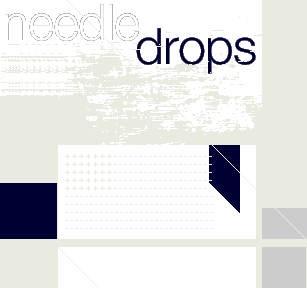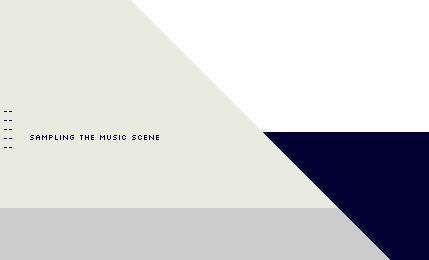


++ Contact Philip Sherburne ++
++ Recently ++
Tuesday, November 29, 2005 = The Stooges Unearthed (Again)
Tuesday, November 8, 2005 = Documenting Beulah And DCFC
Tuesday, November 1, 2005 = Out-Of-Control Rock 'N' Roll Is Alive And Well
Tuesday, October 25, 2005 = Just In Time For Halloween
Monday, October 3, 2005 = The Dandyesque Raunch Of Louis XI
Monday, August 15, 2005 = The Empire Blues
Tuesday, August 9, 2005 = David Howie's Sónar Diary
Monday, July 25, 2005 = Hot Sounds For Summertime
Monday, June 27, 2005 = Overcoming Writer's Block At Sónar 2005
Monday, June 4, 2005 = Cool New Sounds To Download Or Stream
++ Needle Drops Archives ++
View full list of Needle Drops articles...
|
|
 |
February 8, 2002
++ The Glitch Rock Sound Of Hood
++ No one talks about harmonic convergence any more, but that's what seems to be happening between rock and electronic music.
Like green shoots sprouting out of silicon, acoustic elements have recently begun infiltrating electronic music's calculated austerity: think of Fourtet's shimmery breakbeat folk, or Dntel's My Bloody Valentine-inspired fuzzpop. But just as interesting is the flipside of the phenomenon, in which experimental electronics are turning up embedded in the traditionally organic fabric of pop and rock. Radiohead may have garnered the biggest buzz for their recent fusion of power chords and programming, but Leeds, England's Hood provide an even more nuanced portrait of indie pop at the turn of the century.
There's an important distinction between the two bands: while Radiohead's Thom Yorke has become something of an electronic-music booster, going out of his way to namecheck Autechre and charting the likes of Kid606 in his top-10 lists, Hood take a more cautious view of electronica, even as they borrow its flourishes. The perspective could come off as brash, even arrogant, but instead they wind up playing the role of the loyal opposition.
The group emerged a decade ago, as so many bands did back then, with a 7-inch single and a shambly, lo-fi sound, and they quickly found favor with fans of Flying Saucer Attack's bedroom psychedelia. Like the blurry photographs adorning Hood's record covers, their fuzzed-out pop suggested dusky landscapes and wistful abandon. Hood's predilection for tape loops and found sounds marked them early on as decidedly left-field, but by last year's "Home Is Where It Hurts" EP, they'd gone digital, brushing their feathered guitars over gritty click-tracks and grafting glitches onto monotone, shoegazer delivery.
Hood's Richard Adams — bassist, guitarist and brother of vocalist and guitarist Chris Adams — takes comparisons with Radiohead's electronic conversion in stride. "I think it's a bold move by them; the danger is that we get accused of jumping on bandwagons. But that exactly isn't what we're doing. It sounds ridiculous, defensive even, but we've used electronic elements since we started. Even on [1994's] Cabled Linear Traction, there were definitely elements of Aphex Twin-type sounds. We never wanted to do just your traditional indie rock thing, like 10 rock songs to an album, but to really mess it up."
But Hood have also made some rather inflammatory comments about the state of electronic music — comments that some fans of the genre might not appreciate coming from a rock band. In an interview with Sound Collector magazine, Adams called the "electronica movement" (the magazine's words, not mine) "sometimes inspiring, often horribly mediocre:
"I think a lot of people are getting respect for doing very little," Adams said in the Sound Collector inteview. "I'm still primarily concerned with the band aesthetic and bothering to use real instruments and trying to push things. There's so many people just going over the same ground and so many poor records in electronica that I think people need to start re-assessing it. I think because a lot of the records use sounds and textures people are unaccustomed to — it becomes difficult to critically assess them and see through the bullshit. A lot of it is just lazy rubbish. We're basically catering to the one percent who want to dig a little deeper, take in the influences but also move it on. Just get a copy of the MAX software by Cycling '74 and Reaktor by Native Instruments and you won't buy another electronica record!"
I asked Adams if he wasn't setting up a double standard for rock and electronica — after all, there's no shortage of poor records or lazy rubbish in indie rock. But Adams didn't shy away from his critique.
"As far as rock goes, it's easy to see what's good and what's bad. Electronica's so new, it's difficult to judge. Sometimes there are records that come out that just aren't very good, and yet they'll get a lot of praise — but you're right, it isn't any different from rock in that way. I think a lot of people have just started to make electronic music, coming from a background of being able to program, and at the end of the day, the musical element is sort of lost a little bit."
What impressed me in Adams' answer was his emphasis on the importance of listening to the structure, and not just the technique. "I'm not saying people shouldn't do it, because it's completely punk rock that anyone can get on a computer and make music, but a lot of people are doing it and not really.... It's kind of getting respect it doesn't really deserve. It deserves pulling apart a bit more, I think."
Of course, Adams isn't the only person making this argument: Touch co-founder Jon Wozencroft riled up the audience at last year's Ars Electronica by accusing the clicks-and-cuts crowd of taking the easy way out. As the noaltgirls quote, Wozencroft colorfully opined, "With every ten iBooks sold five new glitch artists and seven labels appear. . . . Cheap technology produces too much crap music. We are fucked by technology."
Even Jim O'Rourke, who has recently released a CD culled from various PowerBook improv sessions, has railed against the lowered standards of digital composition.
Adams, unlike many technological converts, has no interest in mystifying digital processes. "It's incredible, the stuff that can be done," he says, noting at the same time that he's an "amateur" compared with his brother Chris, the group's technical guru. (When I ask Richard what software they're using, he admits that he has no idea, and suggests I email his brother. "It's embarrassing when people do ask, because I just don't know," he says, trailing off into a fit of laugher. "It's like I'm completely and utterly living in a different century to him.")
"It's so much easier than when we were actually recording onto analog tape. We're writing songs now literally putting one line of a bassline down and looping it. My job's been made so much easier," he says, collapsing again into self-effacing laughter. "I don't have to keep time any more!"
But this admission affords him a critical perspective when it comes to evaluating the genre as a whole. "It's easy to do, and it sounds fairly professional straight away, whereas if you form a band you really have to get your shit together. I think electronic music, because of the computer element, can be tidied up in such a way that on first listen it sounds well put together, even though it actually isn't, it's all over the place. You can see the thought hasn't gone into it — it sounds good because of the equipment that's being used. And another thing is that there are a lot of people using the same equipment and sounding similar, which is kind of a worry as well."
And with this, he walks right into my next question, because in Hood's adoption of electronic elements, they've incorporated a healthy dose of glitch rhythms — possibly the most fashionable sound on the market today, not to mention being the target of Wozencroft's wrath. Aren't they worried about the record sounding dated, a few years down the line? I'm shocked when Adams responds with an emphatic, "Yeah, definitely, definitely. I'm really worried about it.
"The thing is, we try our best to make music that won't date," he continued. "But on the other hand, I think we were kind of in the position where we wanted to do something that was immediate. We've made albums before what will not date ever, but couldn't grab the listener enough. So we almost had to give in and say, right, let's put some stuff in that will... I was really bothered about getting people to listen to the record, getting them hooked into it. We're always interested in using new stuff, but yeah, we have used the glitch a lot, and I'm kind of worried about it. I hope the songs will stand up, but yeah."
As he's talking, all I can think of are the days of sampling's infancy, when every pop recording on the UK charts was marred by garish orchestral stabs, and I wonder if the glitch will serve that role for the late '90s and early '00s. Adams interrupts my train of thought: "It's like when you listen to '80s music that at the time, probably sounded groundbreaking. You know, we always talk about those orchestral stabs...."
We both erupt into hoots as I tell him what I was thinking. "Yeah! Yeah, listen to a record that that's got that on it now and you think, oh, God, I know exactly when it's from. It puts a date stamp on the music. I think we're aware that's a downside, and we just thought, well, we haven't done this before; we tried to make stuff on the last couple of albums that could be from any time, and listening back, it actually hasn't dated. But yes" — he laughs for the umpteenth time — "I just kind of hope it doesn't date too much too quickly.
|
| |
|